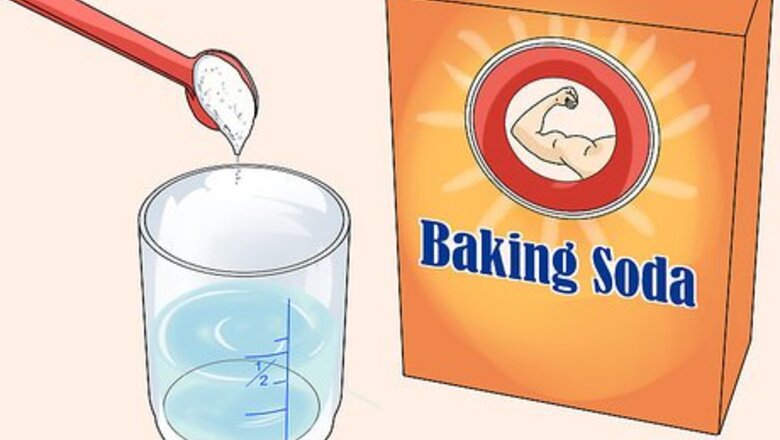
views
X
Research source
Short-term consumption is usually safe for most people, but avoid it if you have certain health conditions, like kidney disease, liver disease, or high blood pressure, or if you’re pregnant or nursing. Baking soda is not recommended for long-term use, and it's best to consult your doctor before using it to treat any health condition.[2]
X
Research source
Mixing and Drinking a Baking Soda Solution
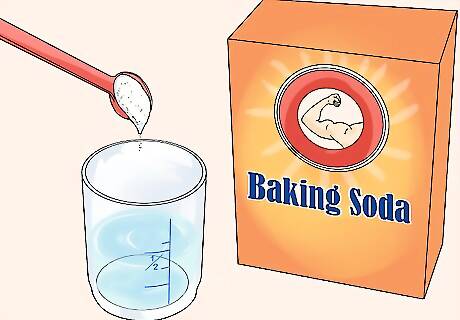
Dissolve 1/2 teaspoon of baking soda in 1/2 cup of water for 1 dose. Pour 1/2 cup (125 ml) of plain water into a glass. Then, measure out 1/2 teaspoon (2 grams) of baking soda and stir it into the glass of water. Keep stirring until the baking soda dissolves completely. This amount is considered to be a single dose.Tip: Make sure you’re using baking soda, not baking powder! They aren’t the same thing, and baking powder isn’t safe to drink.

Drink the solution after you’ve digested your most recent meal. You can take baking soda any time of the day, but it’s important not to consume it on a full stomach. Doing so could cause stomach ruptures. You don’t necessarily have to take it on a completely empty stomach, although that is preferred. Just make sure you’ve digested your last meal before drinking the solution.
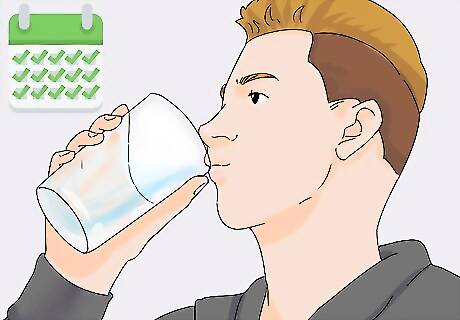
Take a single dose once daily for general health benefits. Choose a specific time per day for your dose and be consistent so you don’t forget. It's best not to consume it in the morning, so aim for 1 hour before lunch or 1 hour before your evening meal. Taking more than a single dose per day is usually not recommended and can cause serious health problems, like heart attacks or hyper alkalosis. General health benefits may include improved digestion and immune response.
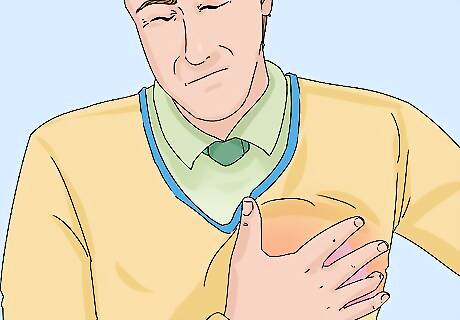
Monitor how your body responds after drinking baking soda. Drinking too much baking soda can be harmful. Watch for side effects like a racing heart or an irregular heartbeat, which can indicate that you've taken too much or that your body's sodium levels are too high to safely take baking soda. Do not take it again if you experience side effects, and see your doctor to have your sodium levels checked as soon as possible. Vomiting or diarrhea after taking baking soda may indicate that you've taken too much. Contact Poison Control or consider going to the emergency room. If you're nervous about trying baking soda, consider starting with a much smaller dose, like 1/8 teaspoon (0.5 grams) or 1/4 teaspoon (1 gram) dissolved in water.
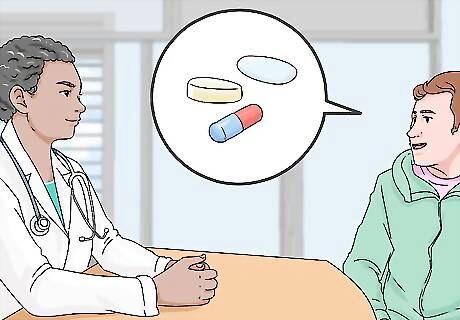
Discuss this supplement with your doctor if you plan to take it daily. Small amounts of baking soda are usually considered to be safe for healthy people, but people with certain health problems shouldn’t take it regularly. It’s high in sodium, so it’s not recommended for people with high cholesterol or those on a sodium-restricted diet. Talk to your doctor about taking baking soda if you are on any kind of medication. People who should avoid it altogether: Women who are pregnant or nursing Individuals with edema, liver disease, kidney disease, or high blood pressure Children under the age of 5 Ella Marie Ella Marie, Naturopathic Doctor While some tout baking soda as a cure-all, science shows targeted benefits, not one-drink-fixes-all. Consuming it can temporarily neutralize stomach acid, relieving reflux or upset. Its alkaline nature may counter pathogens and inflammation. However, risks like sodium overload, kidney strain, and nutrient depletion arise with frequent intake. Any consumption beyond minor food uses requires medical supervision to augment health, not endanger it.
Treating Different Conditions with Baking Soda
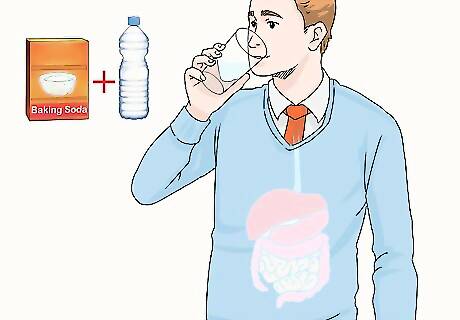
Take baking soda to improve your digestive system. If you suffer from acid reflux, baking soda can help neutralize that acid and provide relief from heartburn. Baking soda may also help your body digest food better, reduce bloating and gas, and promote healthy bowel functioning. Take 1 dose per day, or on the days when you think you might need a digestive aid. Baking soda neutralizes acidity, and the effervescence of the solution eases bloating and gas by encouraging burping.
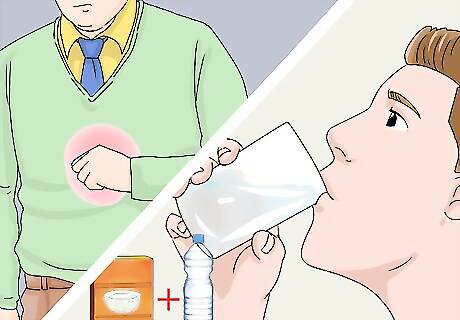
Use baking soda to lower your body’s overall acidity levels. Baking soda is alkaline, so it neutralizes acids of all kinds. As long as you're healthy, you can try taking baking soda to low acidity levels in your body. Consider taking 1 dose per day to reap consistent benefits.
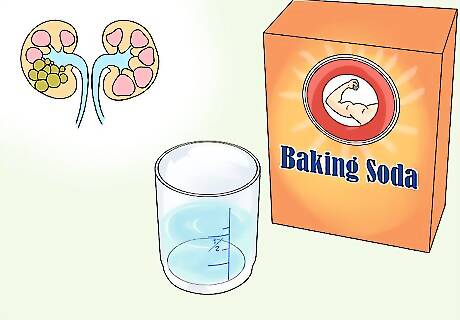
Treat kidney stones and urinary tract infections with baking soda. The kidneys and urinary tract are both vulnerable to acidic urine. Taking 1 dose of baking soda per day may discourage the formation of kidney stones and help you overcome UTIs more quickly. While baking soda may help with mild kidney problems, it's not recommended for people with kidney disease or renal failure. Reducing the acid levels in urine may also provide relief for people suffering from UTIs.
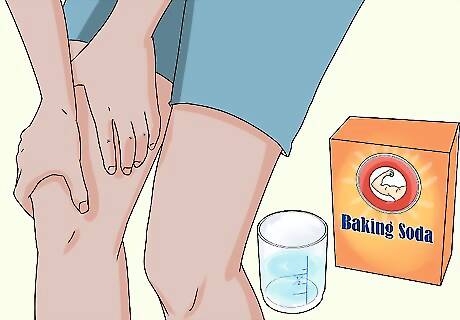
Prevent sports-related muscle pain and fatigue with baking soda. Intense physical activity causes lactic acid to build up in the body, which leads to pain and fatigue. It's believed that drinking baking soda can delay that buildup, which increases performance, endurance, and speed but scientific tests on the subject remains inconclusive. If you’re a professional athlete, talk to your trainer about using baking soda. Because of its performance-enhancing properties, baking soda consumption is banned in some sports.
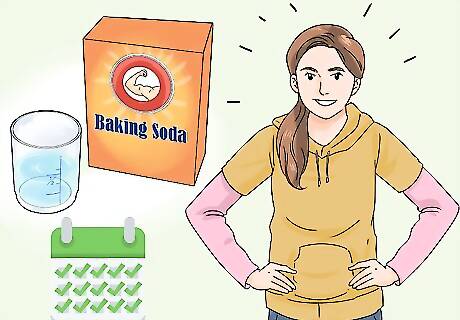
Improve your overall immune health by regularly taking baking soda. Regularly consuming baking soda may help to treat auto-immune related conditions like rheumatoid arthritis and gout. Talk to your doctor about using baking soda for this purpose before taking it regularly.




















Comments
0 comment